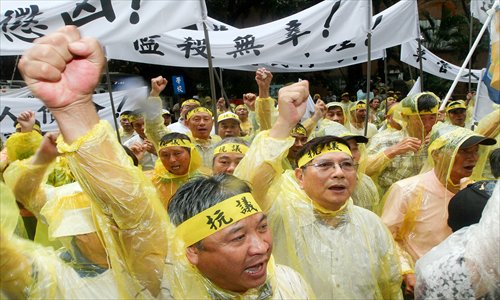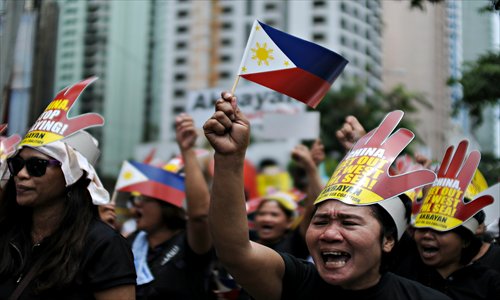HOME >> CHINA
Crisis mismanagement
By Jiang Jie Source:Global Times Published: 2013-10-10 20:43:01

Nearly 400 fishermen from Taiwan protest on May 13 in front of Manila Economic and Cultural Office in Taipei after a fisherman was shot to death. Photo: CFP

A protest against Chinese "bullying" by several hundred Filipinos in Manila, July 24, 2013. Photos: CFP
Hongkongers clearly recall August 23, 2010, the day their dinner table TV viewing turned into a live broadcast of carnage: 23 Hong Kong tourists held hostage by a gunman in Manila, followed by a botched Philippine police rescue that left eight dead and seven injured.
"The victims shouldn't have died there simply because the Philippine government didn't make the wise decision," Sham Yan-lan, chairwoman of the Hong Kong Journalists Association, told the Global Times on Tuesday, her rapid-fire speech suddenly slowing to a low, deliberate tone.
Sham is not the only reporter nursing a scar, though three years have passed since the incident occurred.
On Tuesday, a crowd of more than 30 people organized by the association launched a protest outside the Indonesia and Philippines consulates in Hong Kong, holding up placards including "Please respect press freedom" and "We throw questions, not bombs".
The conflict
They were demanding an apology for the Hong Kong journalists who had been kicked out of the 2013 Asia-Pacific Economic Cooperation (APEC) summit in Manila on Sunday.
Footage by Hong Kong's Now TV showed journalists shouting questions about the three-year-old Manila hostage crisis at Philippine President Benigno Aquino III as he walked down the corridor.
Their credentials were later confiscated due to their "demonstrative" act like "protesting", said a media officer at the forum.
Some Hong Kong journalists were even reportedly held in custody after their expulsion.
"Our journalists are not terrorists and they should not be treated in that way when they were simply doing their jobs," Sham said, demanding that new credentials be issued to the expelled journalists. The families of the victims in the crisis have been demanding an apology and compensation from the Philippine authorities. They also want responsible officials to be punished for the botched handling of the crisis and a better guarantee of travel safety for Hong Kong tourists.
In the period leading up to the questions directed at the Philippine President, Chinese President Xi Jinping Sunday ordered related Chinese departments to follow up on the issue and China's Ministry of Foreign Affairs also urged the Philippine government to properly handle requests from the family members of the victims.
One of the two survivors, Yi Xiaoling, said that she felt hope when hearing Chinese authorities pressing the Philippine government, but that hope was dashed upon hearing that Hong Kong reporters had been barred from the press conferences.
President Aquino III, while extending sincere condolences to the victims, noted that in Filipino culture, they only apologize when they admit that they are at fault as a country, as a government, and as a people, according to the Philippines-based GMA news.
This response drew outrage online, as some Net users said a public apology was the very least Manila could do and that flying a flag at half-mast flag was not enough of a gesture.
"We haven't seen any measures taken to improve the security environment and prevent similar tragedies, which reflects poor management by the authorities," said Fan Po-hung, a professor with the Chinese University of Hong Kong.
Views in the Philippines were mixed."I do sympathize with all the victims, but asking for the president to apologize is too much, since he represents our country. We hope that you will not treat one bad act of a Filipino as something that all Filipinos do," an accountant from Manila, who asked to remain anonymous, told the Global Times.
Another Filipino student echoed her. "I don't think President Aquino should apologize, because no one wanted that incident to happen in the first place and our government did its best to save the victims," said an anonymous Filipina student in Anhui Province. "Not only have the Hong Kong people suffered from the crisis, but it also affects our economy, especially when it comes to tourism," she added.
Since the crisis, the number of Chinese tourists visiting the Philippines has decreased.
Hong Kong has not lifted its travel warning since the crisis and its biggest travel agency, the Hong Thai travel agency, has deleted the Philippines from its destination catalogue.
"People like to travel to Southeast Asian countries, but the hostage tragedy has killed our interest in the Philippines," said Lee Ka-man, an associate professor at the Hong Kong Shue Yan University.
Tough stance
The hostage issue is not the only problem for Sino-Philippine relations.
Earlier in May, hundreds of Taiwanese fishermen burned the Philippines national flag and threw eggs at the representative office of the Philippines in Taipei to protest against a fatal shooting that killed a Taiwanese fisherman. The Philippine government again refused requests by Taiwanese authorities for a probe, and refused to apologize.
Wang Xiaopeng, an expert in maritime and border studies at the Chinese Academy of Social Sciences, said that Philippines might think the US would back its hard-line response, but that there would not be support from any party in such a serious matter.
He said that American pressure played a key role in Manila's handling of the fatal incident where shots were fired upon a Taiwanese fishing vessel by Philippine Coast Guard officers in May. He also added that the Philippine government had been attempting to win international sympathy by highlighting the maritime dispute over the South China Sea to complicate its botched handling of the Hong Kong hostage crisis.
Friendly civil ties?
Although some Chinese commentators have said that there is some anti-Chinese sentiment in the Philippines regarding the hostage issue or other issues like South China Sea or Huangyan Island, ordinary Chinese people living in the Philippine archipelago insisted that they rarely sense unfriendly attitudes. Chinese reached by the Global Times said that their lives remain normal. But some of them said they are concerned about the poor security.
One Manila wholesale market worker told the Global Times that the market where she worked had been burnt down by Filipinos.
"In spite of that, we can earn more money in the Philippines than in China.
But we don't spend much money on entertainment like we often do back home due to security concerns," she said, adding that she can bring home 50,000 yuan ($8,170.45) a year.
Meanwhile, Hong Kong residents who employ Filipino nannies have reacted calmly to the incident.
"Few helpers have been dismissed in the last few years in Hong Kong, as far as I know," Lee Ka-man, an assistant professor at the Hong Kong Shue Yan University, told the Global Times.
"It's the government that should take the blame, not its people."
Posted in: Society